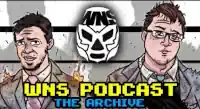Eric Bischoff on William Regal and Triple H’s Relationship: ‘It’s Fascinating!
Posted By: WrestlingNewsSource.com on May 26, 2024On the latest episode of his “83 Weeks” podcast, WWE Hall of Famer Eric Bischoff provided insights into William Regal’s professional relationship with Triple H, his tenure at WWE, and other related topics.
Here are some highlights from the podcast:
On William Regal’s relationship with Triple H and his impact on WWE:
“It’s fascinating to watch, fascinating to see where both of these individuals are at. Because they both have the same work ethic, they both approach the industry the same way. And I think over time, I would imagine , I don’t know, I don’t talk to Paul Levesque on a personal basis. But I would imagine that Paul has learned to have even more respect for Steve Regal, and what Steve could contribute. And I talked about that in the very beginning of the show, and I said, ‘More on that later.’ But if you look at where Steve is at now, I wouldn’t necessarily call him a power broker. I would disagree with that, or maybe just phrase it differently. What Steve does now is work with , amongst other things, I’m sure a lot of other things. But from what I understand, he’s working with young, emerging talent in NXT. Teaching them psychology, teaching them how to make the most of every single decision you make. You’re artistically efficient when you approach a match the way Steve Regal would want you to approach a match. You make every little detail important. That’s what Terry Rudge taught him, that’s what Dave Taylor taught them, that’s what Pete Roberts taught him…
“All of this influenced him, everything he learned in Germany, he toured in Germany in his late teens and early 20s. All of that experience has taught Steve Regal to pay attention to little details, and make everything count. And I have very good authority that some of the top talent today in WWE , they come through the curtain, one of the first people who are looking for Steve Regal to get his input on whether they sufficiently paid attention to the little details. So it’s not just the NXT talent that Steve probably works with primarily. It’s with the seasoned talent, some of them at the highest levels are still looking for input from Steve Regal. Because Steve Regal is paying attention to the little details in teaching the talent how to do the same. So when you see a pinfall in WWE? Analyze it. Is it believable? Look real, look like you could actually be a pinfall attempt? Or does it just look like one link in a chain of links all strung together to build a wrestling match? That’s what Steve Regal does, and that’s what , I think very few people in the industry have the instinct, the training that’s just part of their DNA to do a good job teaching that. Some people will listen. The ones who succeed will. Some people will just let it go in one ear and out the other, but that separates superstars.”
On Regal’s battle with addiction:
“Even in Steve’s own story, you know. It started out with prescription Valium to help him sleep. Okay, get that. Not that uncommon. Valium is a pretty powerful drug to try to use on a nightly basis to sleep, but whatever. I get it. But then it became recreational. Once you go from, ‘Okay, I’ve got this prescription, I actually need it, and I’m using it the way it’s instructed’ to, ‘I got nothing to do today and I’m a little bored, and I don’t like feeling bored.’ Or, ‘I have anxiety’ or whatever, the multitude of things that we all deal with every day. You have access, and your go-to is ‘I think I’ll just have a couple of Valium, and drink a bottle of wine.’ That’s when you fall off the slope. And that’s , I mean, it’s so common. And it’s not like everybody who got hooked on drugs did so because, ‘Well, the doctor prescribed it for a legitimate injury. So I kind of inadvertently got hooked on it.’ Some people that happened, no doubt. I’m not questioning whether to say it did or didn’t. But I’ve also seen the pattern hundreds of times where it starts out recreationally. And you go downhill super fast. It’s the worst. People talk about, ‘Oh, steroids killed all these wrestlers.’ It’s not the steroids. Steroids aren’t really the issue in wrestling. Never really was.
“The problem , Don’t get me wrong, but the thing that killed people is this combination of steroids and the stress that it puts on the heart. Painkillers , we all know what they do to you , and then the pills that you take to come out of the stupor. You start mixing these cocktails up to get through your wrestling day. You’re on the road, you’re away from home, you don’t have any structure in your life. You don’t have somebody who’s responsible, you’re not surrounded by family. Or sometimes you are, but you do it anyway. It’s the painkillers, Somas, and the alcohol that are the things that killed our wrestlers more than anything else.
“And the fact that Steve was able to pull the nose up , I know we’re probably going to talk a lot about it. Hopefully not too much because, you know, Steve talks about it in his book. But the fact , however much we cover it, doesn’t matter to me. The fact that Steve was able to first recognize he had the problem was, particularly severe as it was. Because once you fall off the cliff, you don’t necessarily want to climb back up. It’s too comfortable staying where you’re at. That’s the problem, right? You know how hard it is to get back up on top of that cliff that you just fell off of. So you just keep doing it till you’re dead. And Steve was one of the lucky ones, one of the strong ones. It’s not just luck. It’s strength, character, and discipline to pull the nose up out of it, and look where he is today. Amazing.”
⚡ Explore WNS
Jump To Comments

Popular Tags
Popular Articles

Become WNS Member

Member Login

Edit Profile

Blocked Users

LeaderBoard

Donate to WNS

Logoff


























Leave a Comment ()